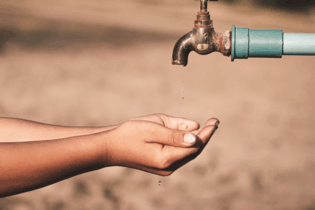In July of 2010 the United Nations (UN) General Assembly voted that all human beings have the essential right to clean drinking water and proper sanitation. This motion was part of a greater initiative to promote the issue of a global water scarcity. In 2005 the UN declared 2005-2015 The Decade for Action: Water for Life in order to raise a greater awareness and promote clean water programmes globally as a means to aid in the achievement of Millennium Development Goals; many of which depend on upon access to clean drinking water and proper sanitation.
The World Health Organisation (WHO) and the UN both describe water scarcity as either the physical absence of clean drinking water in dryer regions of the globe, or as an economic shortage in regions that do not have the proper infrastructure in place to provide clean drinking water to the people living there. Thus, water scarcity is both a natural and a man-made phenomenon that is caused either naturally in certain regions where the population exceeds water levels or artificially via the unsustainable management of water.Water scarcity: the facts The UN estimates that approximately one fifth (900 million to 1.2 billion) of the global population is affected by the issue of water scarcity. The vast majority of people that are affected by this issue also happen to live in the developing world, which only further exacerbates the problem due to the many other challenges that they face. However, the resolution of this issue also serves to expedite the resolution of other issues recognised by the UN as being either associated with or directly related to water scarcity. Several Millennium Development Goals are wholly dependent upon the success of campaigns to improve access to clean water. The Millennium Development Goals, which were created in 1993 by the international community and several NGOs, were done so with the hope that they would be realised, or on their way to realisation by the year 2015. The Millennium Development Goals include the improvement of nutrition, the eradication of extreme poverty and hunger, the reduction of disease and child mortality, the promotion of gender equality and universal primary education; all goals corresponding with the establishment of rights secured by the Universal Declaration of Human Rights. As of yet, many of these goals have not been reached. The UN and the WHO both state that improving access to clean water will drastically reduce disease and child mortality. This is because the consumption of contaminated water is known to lead to the contraction of deadly diseases such as cholera, or other diarrhoeal diseases. Furthermore, managing the problem of water scarcity may also aid in the reduction of poverty and hunger as new technologies are implemented to reduce water waste and improve agricultural techniques. The problem of water scarcity also exacerbates existing rights issues such as that of gender inequality. The Water Project, an international NGO aimed at improving access to clean water in accordance with the goals set by the UN, stresses that women often bear the primary familial responsibility for fetching water in many regions where water scarcity is common. Often, they must travel long distances on foot, and gather water multiple times daily. The time spent retrieving water often reduces access to other opportunities that they might otherwise have had, including the universal right to an education. This impact of water scarcity severely and disproportionately disenfranchises young women on the basis of their gender. In a 2011 UN report entitled Global Drylands: A UN System-wide response, the preface by Executive Secretary Luc Gnacadja of the United Nations Convention to Combat Desertification stresses that, “90% of the world’s dryland populations live in developing countries where women and children are most vulnerable to the impacts of land degradation and drought.”
His acknowledgement only further stresses the assertion that water scarcity can easily become an issue that has an effect on gender inequality, and in turn, other rights issues. In order for help promote equal opportunity for all genders, the UN’s message is that access to water needs to improve.
Decade for action: water for lifeWhen the UN named the ten years following 2005 the decade for action regarding improving access to clean water, expectations of the international community and NGOs had been risen as a result of the goals set out by the initiative. From 2005, the UN and the WHO each began to individually release yearly reports that upon fully researching the current situation, estimated the number of people still without access to clean water and made suggestions in order to work towards solving the issue and meeting certain goals for improvement. Furthermore, other NGOs and watch groups, such as The Water Project, began to follow suit and publish their own yearly reports on the water situation. In addition to yearly reports, water scarcity also became a key issue featured in the agendas of important global conferences including the World Health Assembly and the United Nations Conference on Sustainable Development. These conferences attempt to serve as important global forums for the exchange and dissemination of ideas, the proposition of challenges and the sharing of information, as well as arenas in which to hold global actors accountable for their previous commitments to addressing water scarcity. Following the call of global NGOs to address human rights issues resulting water scarcity, the UN is currently working through its inter-agency mechanism, UN-Water, to implement initiatives in water scarce areas such as the UN Water Task Force for Sanitation, which aims to meet the sanitation targets of the Millennium Development Goals. It is also attempting to research new technologies to improve equal access. The 2010 declaration by the UN General Assembly that access to clean drinking water is an essential human right is one that should not be taken lightly, but also, should be regarded cautiously. Of the 192 member General Assembly, 122 voted in favour of the motion and 41 abstained from voting. Some of the countries that abstained, including Canada, The United States and Britain, are first world nations that appear to be reluctant to acknowledge the right to water as a true right. Progress on the water scarcity issue will prove difficult to maintain should the leaders of water rich nations refuse to acknowledge access to water as a basic human right. This would undermine the initiative as a whole, especially when developed nations tend to be those which are able to fund UN programmes. Source: theinternational.org







